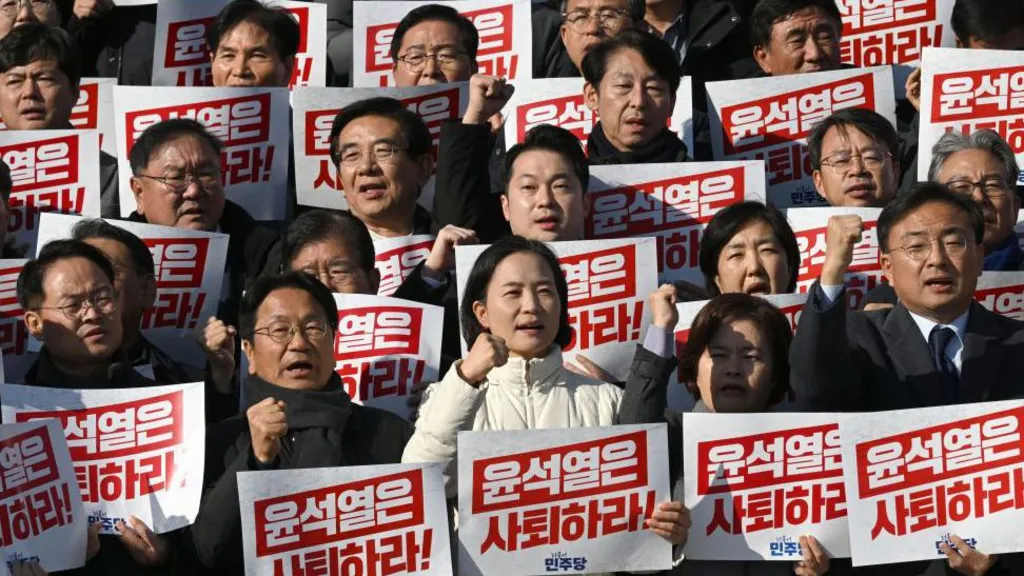
The Declaration and Initial Effect
South Korea saw a dramatic shift on the night of Tuesday when President Yoon Suk Yeol suddenly declared martial law. The declaration was made through a late-night television address that was the first in nearly five decades. Quoting threats from "anti-state forces" and North Korea, the president argued it was crucial to the nation's security. However, soon after, it came out that the move had more roots in internal political conflicts than external threats.
In a televised address, Yoon accused political opponents of bringing down the government and stated that the military would seize control in a "temporary measure to restore order." Armed troops and police flooded major sites immediately, including the National Assembly building, which is reported to have had helicopters land on its roof.
Media footage caught scenes of masked, heavily armed soldiers storming the building while staffers attempted to fend them off with fire extinguishers. By 11:00 PM local time, or 14:00 GMT, the military had issued decrees outlawing protests, limiting political activity, and placing the media under government control.
National Backlash
Political leaders quickly condemned the declaration, including members from Yoon's conservative People's Power Party. Opposition leader Lee Jae-myung from the Democratic Party labeled the martial law order unconstitutional and called for mass protests.
"Tanks, armed vehicles, and soldiers will be occupying our streets," Lee threatened. "Gather in the National Assembly." Thousands of citizens took up the challenge and amassed outside the closely guarded parliament. They shouted slogans such as "No martial law!" and "End dictatorship now!" Despite all that had transpired, the rallies remained largely peaceful. Inside the National Assembly, opposition lawmakers, with a few members of Yoon's party who opposed the decision, tried to call for an emergency session. Military barricades did not stop them: they climbed over fences and rushed to gather enough representatives for a vote.
Martial Law Overturned
Not much after 1:00 A.M. on Wednesday, the parliament, with 190 of its 300 members present, voted by an overwhelming majority to annul the martial law order. Under South Korean law, such a vote nullifies the declaration and forces the government to rescind it. Hours later, President Yoon appeared under mounting pressure to formally revoke the order.
The Context of Yoon's Decision
Since he took office in May of 2022, President Yoon has faced growing political pressure. His government has been paralyzed by legislative support since April's general election when opposition parties won in a landslide. His approval ratings have dropped down to as low as 17%, and Yoon has been fighting scandals that also include allegations of corruption involving his wife and stock manipulation against his associates. Just recently, the opposition put forward a proposal to cut a major part of the government budget and started impeachment proceedings against some members of the cabinet led by President Yoon. Declaring martial law under such circumstances is deemed a last-ditch ploy to consolidate power.
Historical and Political Significance
Finally, martial law, the last declared in South Korea in 1979 during the military dictatorship of Park Chung-hee, reminds the country of its messy past. South Korea has prized itself on democratic governance ever since the transition to democracy in 1987. Yoon's decision has been widely condemned as a step backward for the country. "Yoon's declaration sounds like an irresponsible overreach at worst, jeopardizing the South Korean economy and stability," political analyst Leif-Eric Easley of Ewha University in Seoul said.
What Lies Ahead for Yoon?
With martial law tossed out, Yoon is under pressure from calls for impeachment. If two-thirds of the National Assembly approved it, the case would be forwarded to the Constitutional Court. If six out of its nine judges agreed with the impeachment, Yoon would be off the stage. South Korea would not be new to this. President Park Geun-hye was impeached in 2016 regarding allegations of corruption, and President Roh Moo-hyun was under the impeachment process in 2004 before his reinstatement by the court. As the dust settles, South Koreans wait to see how long the moves of Yoon will leave their prints on the democracy table. Analysts say the incident has contributed a lot more attention to his leadership and reshaped a type of political environment in South Korea for quite many years.


0 Comments